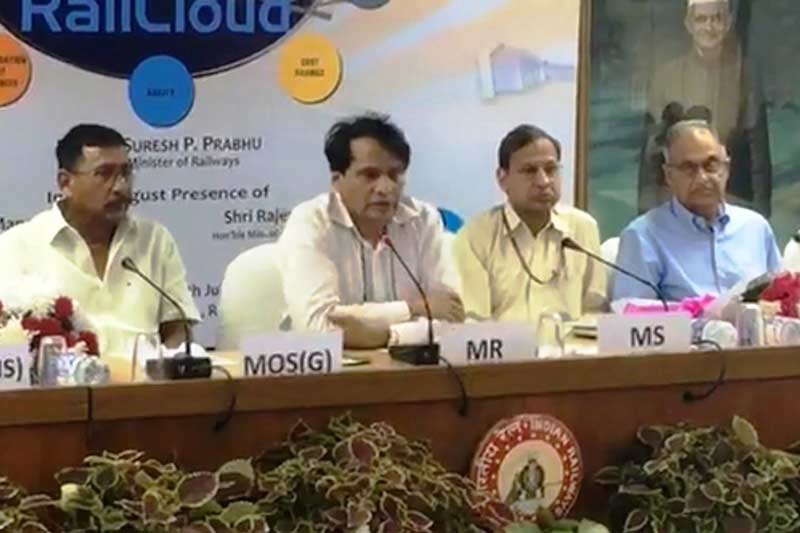
Minister of Railways, Suresh Prabhu (2nd from L)/ Image credit: Twitter feed of Indian Ministry of Railways
In March this year, the Indian Railways (IR) announced plans to develop a common Information and Communication Technology Platform, called IR-OneICT, with the aim of improving customer satisfaction, raising revenue and achieving effective, efficient and safe operations. Today the Minister of Railways, Suresh Prabhu announced one of the foundational projects for the development of IR-OneICT in the form of Railcloud. Minister Prabhu also announced a Cashless Treatment Scheme in Emergency (CTSE) Scheme for railway employees.
RailCloud
The RailCloud project is being launched in association with its subsidiary, RailTel Corporation of India Limited (RailTel). Phase-I of RailCloud has been sanctioned for FY17-18 at a cost of Rs. 535.5 million (USD8.3 million).
Several benefits are expected from the implementation of RailCloud, such as faster and on-demand deployment of applications (within 24 hrs as compared to conventional time running into weeks and months) and rapid scalability and elasticity. Server and storage can be scaled as per demand, enabling the system to meet higher demand at peak hours with reduced total expenditure. Procurement of expensive servers can be avoided.
The press release states that the cloud will be equipped with appropriate security features, as per the latest central government guidelines. Also, the security features can be updated in one go for all the applications hosted on the cloud, resulting in enhanced security and stability with less expenditure and effort.
Minister Prabhu said, “Efforts are being made to bring entire Railway system on Integrated digital platform. RailCloud is another step towards digitisation of Railways. RailCloud works on popular cloud computing system. Most important works are done through cloud computing. Also, this is going to reduce the cost & data may be safely ensured on the servers.”
The Managed Network and Virtual Desktop Interface (VDI) services are also being planned, for providing faster and more efficient work environment to each rail worker.
‘NIVARAN’, the Indian Railways’ internal Grievance Portal for resolution of service related grievances of serving and former railway employees, which was launched in June 2016 is the first IT application to be moved to the RailCloud, from conventional servers.
Cashless treatment Scheme in Emergency (CTSE)
Railway provides comprehensive health care facilities to beneficiaries through in-house health Institutions, supplementing it with referrals to recognised hospitals whenever necessary. These beneficiaries include retired employees and their dependent family members.
The retired employees live all over the country, often far away from the established Railway Health Institutions. CTSE will enable the provision of immediate care for the retired employees through a web based system of communication between private hospitals and railway authorities. Identity of the beneficiary shall be established using biometrics stored in Aadhaar (India’s unique national ID) server and eligibility shall be determined using Railways’ database. The situation of ‘emergency’ shall be verified by Railway Medical Officer based on private hospital’s clinical report. The whole system is online, including the processing of bills.
The scheme is being implemented using existing resources by bringing on board the UIDAI (Unique Identification Authority of India, which handles Aadhaar) and ARPAN (Advanced Railway Pension Access Network) databases.
UTI Infrastructure Technology And Services Limited, a government-owned company developed the software in consultation with Railway and shall be paid the basis of the number of processed bills. The scheme has been rolled out in the cities of Delhi, Mumbai, Kolkata and Chennai, based on the experience of this pilot the scheme may be extended to the whole of country.
















